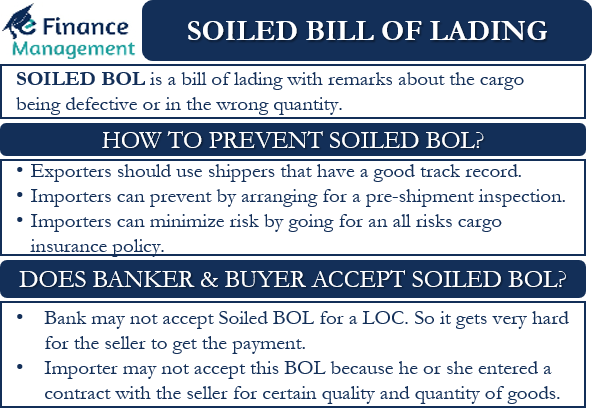A Bill of Lading is a very crucial document in international trade. It serves as a receipt, as well as the contractual undertaking between the carrier and the shipper. Once both parties sign the BOL as it is, the bill of lading becomes Clean BoL. However, if the carrier makes some comments about the quality or quantity of the cargo in the Bill of Lading, then we call it the Soiled Bill of Lading.
It is crucial that it is in normal condition when the shipment is loaded onto the ship or in a container. But, if the shipment seems wrong or faulty, then it shouldn’t be on the ship. This is because it might be a waste of time to deliver a shipment that a buyer may reject. It is also possible that the consignee or consignor may accuse the carrier of damaging the goods.
In some cases, a carrier may allow damaged goods unknowingly. This could happen if the carrier doesn’t have an idea of the content of the shipment, or the shipment is in a container or is packed such that the carrier has no way of knowing if the shipment is proper or not.
There are also cases when the carrier may allow damage or incomplete shipment knowingly. In such scenarios, it is crucial for the carrier to mention the condition of the goods in the BoL. Because in the absence of such declaration or mention on BOL, the entire responsibility falls back on the carrier. Therefore, when a carrier does this, that is when the carrier indicates the defect in the goods, etc., the Bill of Lading no longer remains a ‘clean bill. Instead, it becomes a Soiled Bill of Lading.
Also Read: Bill of Lading and its Types
Soiled Bill of Lading – What it is?
In simple words, we can say that a Soiled BOL is a bill of lading with remarks about the cargo being defective or in the wrong quantity. After a carrier receives the shipment, it can object to the condition of the cargo by including a “claused or dirty” clause in BOL. Along with the clause, the carrier can also put remarks about the condition of the cargo. The remarks can be torn packaging, broken cargo, less quantity, etc.
For example, the exporter declares 60 cartons in the Bill of Lading. But, the carrier verifies that the shipment has 55 cartons only. Thus, the carrier puts a remark on BoL, saying, “five cartons missing.” Now, the carrier will be responsible for delivering 55 cartons only.
Let’s take another example. If an exporter ships machinery, but the carrier puts a remark on the Bill of Lading, saying “unprotected machinery.” Now, the carrier will not have the responsibility for any loss or damage to the machinery because of poor packaging.
The other prevailing names of the Soiled Bill of Lading are the Dirty Bill of Lading or the Foul Bill of Lading or the Unclean Bill of Lading.
Also Read: Clean Bill of Lading
Does Bank and Buyer Accept Soiled Bill of Lading?
A point to note is that a bank may not accept Soiled BoL for a Letter of Credit. If a BoL contains remarks, then a bank may not accept it for a Letter of Credit negotiation or discounting. So, in the case of the Soiled Bill of Lading, it gets tough for the seller to get the payment.
Similarly, an importer may not accept such a Bill of Lading. This is because they entered a contract with the seller for certain quality and quantity of goods. So, no buyer would want to take the delivery of goods that fail to meet the contractual terms.
It is possible that the buyer and seller renegotiate the price of the contract, and then only the buyer accepts the delivery of the cargo with the Foul Bill of Lading.

How to Prevent Soiled Bill of Lading?
The exporter’s responsibility is to ensure that the Bill of Lading is without any clauses or remarks from the carrier. One important step to ensure this is being transparent about the shipment.
For example, the agreement is for the supply of 500 mobiles, and BoL states the same thing, but the exporter is able to produce 400 units. Thus, it is important that the exporter informs about this to all parties before shipping the cargo. It would avoid any confusion or distrust between the parties.
Another way to minimize the clause is to use reliable shippers. It is important that exporters use shippers that have a good track record. Sending shipments through new or those with bad reputation raises chances of goods being lost or getting damaged.
Also, importers can prevent such things by arranging for a pre-shipment inspection. This is the inspection of goods before it leaves the exporters’ premise. Importers have one more way to minimize such risk, and that is by going for an all risks cargo insurance policy.
Final Words
A Soiled Bill of Lading is a hassle for both – the exporter and importer. For a seller, it could result in no payment, less payment, or a delay in payment. For the buyer, it results in delay and loss of potential revenue. Thus, it is important that the seller and buyer take all precautions to avoid Soiled BOL.
Visit Bill of Lading and its Types for more details.
Frequently Asked Questions (FAQs)
We also call the Soiled Bill of Lading as the Dirty BOL or the Foul BOL or Unclean BOL, or Claused BOL.
Claused BOL is a bill of lading with remarks about the cargo being defective or in the wrong quantity.

